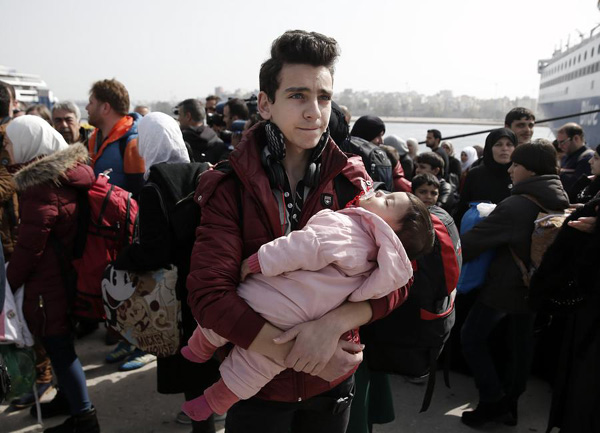EU to propose emergency humanitarian aid to Greece
Updated: 2016-03-02 09:16
(Agencies)
|
|||||||||
BRUSSELS - The European Union is proposing increased humanitarian aid for Greece, where more than 20,000 refugees and migrants are stuck after borders were tightened along the Balkans preventing them from trekking north to wealthier parts of Europe.
|
 |
|
A boy carries a baby as refugees and migrants arrive aboard the Diagoras passenger ship at the port of Piraeus, near Athens, Greece, March 1, 2016. [Photo/Agencies] |
The EU executive's aid and crisis management commissioner will put forward a plan on Wednesday that officials said would allocate 300 million euros ($325 million) this year to helping any EU state, not only Greece, deal with humanitarian crises, and a total of 700 million over the three years to end-2018.
Commissioner Christos Stylianides, who oversees annual foreign aid spending of 1.1 billion euros, will propose funding the new scheme through transfers within the EU's existing multi-year budget, officials said, without touching funds earmarked for humanitarian relief outside the 28-nation bloc.
Beyond 2018, the scheme would continue with further funding.
A European Commission spokesman told reporters the new plan was needed "to prevent humanitarian suffering as a result of an unprecedented number of people arriving in the EU".
Margaritis Schinas said the Commission was very concerned at violence on the Greek-Macedonian border. He spoke as the bloc is gearing up for a summit on Monday with Turkey, the point of departure for the vast majority of people heading to Europe.
More than a million refugees and migrants arrived in Europe last year -- mostly via Turkey to Greece -- and another 130,000 have reached the continent so far in 2016.
Overwhelmed, Greece and other countries along the main migration route have tended to wave the people through and the influx has brought Europe's Schengen zone of free travel to the verge of collapse.
European Commission President Jean-Claude Juncker talked to Greek Prime Minister Alexis Tsipras on Monday and European Council President Donald Tusk will visit Austria, Slovenia, Croatia, Macedonia, Greece and Turkey this week.
Brussels and Berlin, which are battling to make a joint European plan to alleviate the migration crisis work, are banking on Turkey to sharply reduce the number of people embarking for Europe, many of whom have fled the war in Syria.
But a growing number of EU states are resorting to unilaterally tightening their own borders, seeking to control the flow of people and prevent a spike in the arrivals many expect later in March as the weather improves.
Austria, the last stop for refugees and migrants heading to their top destination Germany, infuriated Athens, Berlin and Brussels last month by announcing daily caps on the number of people it processes.
Chancellor Werner Faymann defended the step, saying Austria cannot become a waiting room for Germany.
Tusk, in Vienna on the first leg of his pre-summit tour along the Balkans migration route, said after talks with Faymann: "We must face together the consequences of our decisions. The country that we must support in particular is Greece." ($1 = 0.9211 euros)
Today's Top News
Trump, Clinton scoop up key wins on 'Super Tuesday'
British PM threatened with 'no confidence vote'
70,000 may become trapped in Greece
'Grow people' for long-term China-UK relations
Points of view
Small island makes a big difference
Rubio, Cruz gang up on Trump in debate ploy
'Invented-in-China’ products to the fore at MWC
Hot Topics
Lunar probe , China growth forecasts, Emission rules get tougher, China seen through 'colored lens', International board,
Editor's Picks

|

|

|

|

|

|






